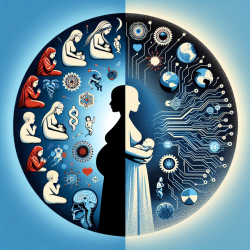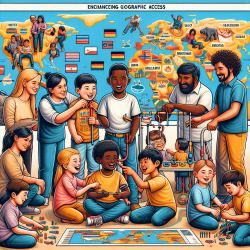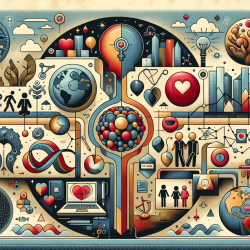The intersection of artificial intelligence (AI) and healthcare is a rapidly evolving frontier with immense potential. Recent research has demonstrated that AI can be a powerful tool in identifying mental health disorders through narrative analysis. One such study explores the use of OpenAI's Narrative Embeddings to detect post-traumatic stress disorder following childbirth (CB-PTSD) by analyzing birth stories. This advancement offers a novel approach to maternal mental health assessment, providing practitioners with new tools and techniques to improve patient outcomes.
The Role of AI in Maternal Mental Health
Childbirth is a significant life event that can sometimes lead to post-traumatic stress disorder (PTSD). Traditionally associated with combat or severe trauma, PTSD is now recognized as a potential outcome of childbirth for some women. The study in question highlights the use of AI models like ChatGPT and the text-embedding-ada-002 to analyze childbirth narratives and identify potential markers of CB-PTSD.
This approach leverages natural language processing (NLP) to transform unstructured text into actionable insights. By doing so, it provides a more nuanced understanding of how language reflects mental health states, offering a promising avenue for early detection and intervention.
Implementing AI in Clinical Practice
For practitioners looking to incorporate these findings into their practice, several steps can be taken:
- Stay Informed: Engage with the latest research through conferences, webinars, and publications. Understanding the capabilities and limitations of AI tools is crucial for effective implementation.
- Collaborate with Technologists: Partner with data scientists and AI specialists to integrate these tools into clinical workflows. This collaboration can help tailor AI models to specific clinical needs.
- Advocate for Training: Encourage training programs that equip healthcare professionals with the skills needed to interpret AI-generated insights accurately.
- Promote Ethical Use: Ensure that AI applications adhere to ethical standards, particularly concerning patient privacy and data security.
The Future of Narrative Analysis in Mental Health
The potential applications of narrative analysis extend beyond CB-PTSD. By refining these models and integrating additional data sources, such as electronic medical records, practitioners can enhance diagnostic accuracy across various mental health disorders. This approach not only improves patient care but also contributes to reducing disparities in mental health treatment by providing accessible screening tools.
Encouraging Further Research
The study underscores the importance of ongoing research in this field. Practitioners are encouraged to participate in or initiate studies that explore the broader applications of AI in mental health. By doing so, they contribute to a growing body of knowledge that could revolutionize how mental health disorders are detected and treated.
The integration of AI into maternal mental health assessment represents a significant step forward. As these technologies continue to evolve, they offer exciting opportunities for improving patient outcomes through early detection and intervention.
To read the original research paper, please follow this link: OpenAI’s Narrative Embeddings Can Be Used for Detecting Post-Traumatic Stress Following Childbirth Via Birth Stories.










